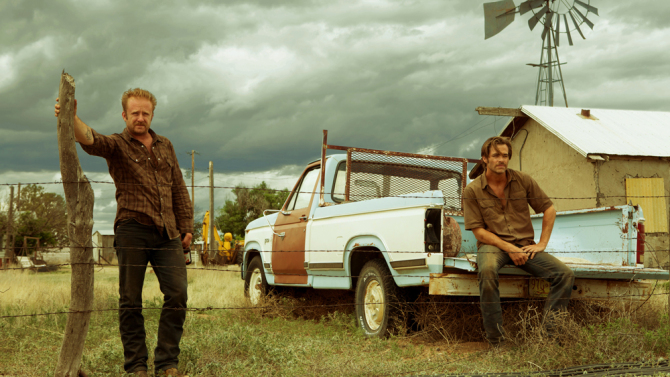David Mackenzie’s previous outing on the big screen was Starred Up, introducing us (properly) to Jack O’Connell and portraying the violence within a UK prison. This time the action has moved stateside and outside, but the focus is still very much on criminal life.
The setting is West Texas and within a few seconds, Mackenzie manages to depict all the destitution and despair in the rural backwaters of the US. We see empty streets with sale signs and foreclosure notices in the windows, graffiti protesting the government’s lack of provision for its ex-service men and women, and the signs of the cross on the church windows across the street in this God-fearing, gun-toting state. Blasting onto this desolate setting are two masked bank robbers, brothers Toby (Chris Pine) and Tanner (Ben Foster).
Setting upon the teller who’s opening the bank, it’s soon apparent that Toby is a rookie and the victim (played by the excellent Dale Dickey, who was so sinister in Winter’s Bone) isn’t afraid to let them know it. We also quickly grasp that Tanner not only has more experience, he also is more violent. As the men screech off to their next robbery, the audience has a clear picture of who these men are and what makes them tick. Tanner is all about the high octane chase and the adrenalin rush of the heist, whereas his younger brother has a focus, which is to save his dead momma’s ranch and leave it to his boys.
In this opening scene Mackenzie sets the tone for the rest of the film, which veers between high tension and laugh-out-loud comedy thanks to Taylor Sheridan’s beautifully balanced screenplay. Continuing from the opening shots, there are also constant references to the dire financial situation of so many in the US, from the waitress who doesn’t want to part with Toby’s generous tip to the old cowpokes who witness a getaway, and all of them put the blame firmly on the banks.
In depicting the disenfranchised and financially broken, Mackenzie is more successful than either Andrea Arnold or Jodie Foster, who both dealt with similar themes in their Cannes offerings. Mackenzie depicts how uneasily Texas embraces contemporary culture and how fiercely it clings to the past in a scene with a cowboy on horseback at a gas station whose horse is worried by two oiks in a sports car blaring out rock music. The film also pokes fun at the gun culture in Texas: when Tanner and Toby rob banks they frequently come across trigger-happy men ready to play the hero.
On the brothers’ tail is the Texas Ranger Marcus (Jeff Bridges) and his sidekick Alberto (Gil Birmingham), the part Cherokee-part Mexican longsuffering butt of his boss’s politically incorrect jokes. Marcus is on the verge of retirement and this could be his last big case. There is a lovely symmetry to the relationships between the two pairs of men, the jokey banter a thin veneer masking the close friendship and love, and as the pursuit crosses the state there are some nice visual parallels.
Mackenzie has not created anything groundbreaking with Hell or High Water, but he has stayed true to traditional tales of cops and robbers, of lovable rogues, and of old, wise lawmakers. Tommy Lee Jones of No Country for Old Men or The Three Burials of Melquiades Estrada is an obvious comparison, but there is also the racist banter between Hank and Steven Gomez in Breaking Bad. Sheridan’s script makes it clear from early on that there is not going to be a happy outcome, for as Tanner points out, nobody ever really gets away with anything.
The four main characters are strong, with Jeff Bridges clearly in his element here. Pine gets his teeth into this lead role and it is great to see Foster share so much screen space alongside him. Their sibling shorthand and their physicality make you believe they are brothers. Yet there are some lovely performances from the supporting cast as the old timers, clerks and waitresses of a Texas that is still part cowboy country and which is reeling from the poverty brought on it by the banks.









